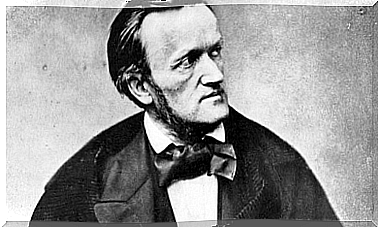What Is Abstract Thinking?

Surely you’ve heard of abstract thinking, but… do you really know what it is? It is a kind of thinking that allows us to reflect on things that are not present in space and in the current moment. It also allows us to reflect on general concepts and principles, both in our daily lives and in a more academic or professional environment.
Does abstract thinking have any advantages? A 2006 study at the University of Amsterdam found that people feel more powerful when they are allowed to think abstractly. This could be evidence in favor of the advantage of abstract thinking over concrete thinking, which would be more restrictive.
Want to know more about this kind of thinking? How is it different from its “opposite”, concrete thinking? What is it for and what benefits does it present? We’ll tell you everything below!

What is abstract thinking and what is it for?
According to the Psychology Dictionary , abstract thinking is the ability to understand essential and common properties. It would serve to keep in mind different aspects of a situation, to predict and plan for the future, to think symbolically and draw conclusions. It would be the opposite of concrete thinking, which in this case is literal thinking based on present time and space.
What is this kind of thinking for? Abstract thinking, as we have seen, allows us to perceive the relationships between different ideas, beliefs or elements of the external and internal environment. In addition, it helps us to innovate, create, imagine, develop new ideas, learn from past experiences and reflect on the future.
This kind of thinking is also a cognitive skill. More specifically, it is one of the last cognitive abilities that humans acquire at an evolutionary level. Without further ado, we will learn more about this type of thinking through a synthesis of its characteristics.
Characteristics
We can list a series of characteristics of abstract thought that refer to its form, content and functions:
- Focuses on elements that are not present (goes beyond the current environment).
- Allows you to imagine, create and innovate.
- It encourages reflective and deep thinking.
- It helps us to find different meanings for each situation.
- It allows us to think abstractly, creating ideas of the same type.
- It is hypothetical-deductive thinking (it allows us to build hypotheses without the need to test them empirically).
- It’s flexible thinking that stimulates debate.
Examples of abstract thinking
To better understand this type of thinking, let’s think of concrete examples, such as a person who thinks beyond what is right in front of him. Illustratedly, imagine a person thinking about a specific book. She will use abstract thinking when thinking about multiple books, books that don’t need to be in the same room or in front of you.
She can also think of the books that represent her, the books she has read, the books that represent the “X” themes… That is, in abstract thinking, in a way, imagination is also used. Another example of abstract thinking would be that used by an artist when choosing the best colors for his painting, or by a musician choosing the best note to finish his symphony.
Other examples: a composer who uses his ideas to create the lyrics of a song, a mathematician who analyzes numbers to draw some conclusion (in the same way a physicist or statistician can extract meaningful relationships from his data), and so on. We also use it on a daily basis when we must analyze certain situations that involve thinking about the past or the future (in addition to the present). In short: we find abstract thinking in multiple situations and scenarios.
When does he show up? Piaget’s Hypothesis
The Swiss epistemologist and biologist Jean Piaget (1896-1980) already spoke, in his time, of abstract thought. Specifically, he developed the hypothesis that abstract thinking as well as reasoning develops at the last stage of development (the stage of formal operations). In fact, Piaget called formal thinking abstract thought, because it belonged to that evolutionary stage.
The formal operations phase begins between the ages of 11 and 15 and lasts until adulthood. The following elements are central to this step:
- Hypothetical reasoning.
- Abstract reasoning.
- Systematic problem solving.
- Abstract thought.
This type of thinking, according to Piaget, is closely related to logic and the ability to solve problems. In this sense, it would be one of the distinguishing characteristics of the human being, what distinguishes us from other animal species.
How to apply abstract thinking?
Can we apply this kind of thinking in our daily life? In which areas? It can be useful for our personal development, in areas as abstract as spirituality.
On the other hand, mastering abstract thinking (as well as its language) can also be useful in fields such as math or science, since analytical reasoning requires the use of abstract thinking. Let’s not forget that, in order to understand a certain subject or knowledge, we must be able to relate it to real life, so that it becomes much closer and more practical.

Differences between abstract thinking and concrete thinking
At the beginning of the article, we alluded to concrete thinking as a type of thinking as opposed to abstract thinking, but how are these two types of thinking different? Abstract thinking allows us to process, describe and manipulate mental information, while concrete thinking does the same, but with objects in the physical world.
On the other hand, we said that abstract thinking was hypothetical deductive. This means that it allows us to create hypotheses without having to test them empirically. On the other hand, through concrete thinking, knowledge can only be formulated through direct experience with the phenomenon in question (that is, it would be a type of inductive thinking).
This thinking goes from the general to the particular (which allows the formulation of laws and theories, for example); on the contrary, the concrete goes from the particular to the general. Finally, abstract thinking allows for reflection and debate (it is flexible thinking), and concrete thinking, on the other hand, does not allow for variations, since it is based on the tangible and the obvious.
As we have seen, this kind of thinking “is everywhere” and has notable advantages when it comes to stimulating other kinds of thinking, such as reflection or reasoning. There are several types of thinking: convergent, divergent, practical, theoretical, literal… Which is the best? All and none; will always be the one who best adapts to the task we want to develop, so flexibility is very important in our cognition.









